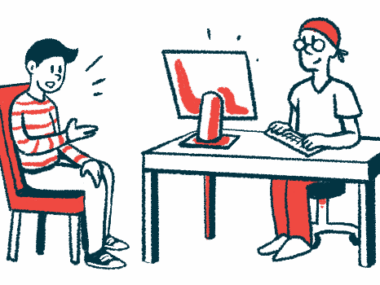With myasthenia gravis, ‘feeling fine’ changes by the minute
I'm not lazy; I'm living in a body whose power flickers on and off unpredictably
Written by |

Most folks have never heard of myasthenia gravis (MG), and honestly, I don’t blame them. It’s a rare autoimmune disease that even some doctors initially miss.
MG plays tricks with the connection between nerves and muscles, kind of like static on a phone line. One moment, the message from my brain gets through just fine, and I can talk, eat, or walk with no problem. The next, it’s as if someone cut the cord. My muscles stop listening, and suddenly, the smallest task feels like lifting a truck.
That’s the thing about MG — it’s unpredictable. I might wake up feeling strong and ready to take on the world, and by afternoon, I’m wiped out, unable to lift my arms or keep my eyelids open. There’s no pattern, no reliable rhythm. It doesn’t matter if I rest well, eat right, or pace myself. MG doesn’t care about schedules. It comes and goes on its own terms, and that makes everyday life feel like a moving target.
When friends or family see me looking fine one minute and completely flattened the next, they’re often confused. And who can blame them? On the outside, I may look healthy. Inside, my muscles are running out of fuel faster than my body can replace it. That crash isn’t about laziness or weakness — it’s biology. My immune system attacks the receptors that help nerves communicate with muscles, so even simple things like chewing, talking, or holding up my head can become exhausting.
Give the gift of grace
The good news is that awareness about the disease is growing. Not long ago, barely anyone knew what MG was. That’s starting to change, thanks in part to public figures like tennis champion Monica Seles, who recently shared her own diagnosis. Seeing someone so strong and accomplished speak openly about MG helps the world realize how invisible this illness can be.
Pharmaceutical companies have also launched targeted campaigns to highlight the ups and downs of living with MG, showing how muscle weakness can strike at any moment. These commercials might be designed to promote treatments, but they’ve also opened doors for long-overdue conversations.
For me, one of the hardest parts isn’t just the physical struggle but managing the guilt that comes with needing to rest or cancel plans. I can feel fine in the morning and look perfectly capable, but by lunchtime, my body might decide it’s done for the day. That unpredictability can frustrate the people I care about, and sometimes it makes me feel like I’m letting them down. But MG doesn’t follow logic or manners. It doesn’t politely wait until after the party or the appointment. It just hits.
If you love someone with MG, the best gift you can give is grace. Believe them when they say they’re tired, even if they “look fine.” Understand that “fine” is a moving target for us — true one minute, gone the next. Encourage rest without guilt. Offer flexibility instead of frustration. You don’t have to fix anything. Just standing beside us, believing our experience, means more than you might realize.
For those of us living with MG, we have to remember that same grace applies to ourselves, too. We’re not lazy or unreliable. We’re navigating a body that sometimes feels like it’s running on flickering power. Every small victory counts: a shower, a phone call, a smile when the muscles want to quit. The world might not see the battle, but those moments of quiet endurance are proof of strength.
So if I seem fine, take it as the blessing it is, but know it might not last. MG is sneaky that way. But even in its unpredictability, there’s resilience. There’s patience. And there’s a whole community of us learning, one day at a time, how to keep living fully in the in-between.
Note: Myasthenia Gravis News is strictly a news and information website about the disease. It does not provide medical advice, diagnosis, or treatment. This content is not intended to be a substitute for professional medical advice, diagnosis, or treatment. Always seek the advice of your physician or other qualified health provider with any questions you may have regarding a medical condition. Never disregard professional medical advice or delay in seeking it because of something you have read on this website. The opinions expressed in this column are not those of Myasthenia Gravis News or its parent company, Bionews, and are intended to spark discussion about issues pertaining to myasthenia gravis.




William A Moyer (Bill)
Thank you, Shawna, for an excellent article! You have described my life to a ‘T’.
I often feel guilty for not being able to do what I used to do easily & have to lean on others for assistance. You described accurately what MG does to us. Knowing that others have the same struggles with MG is, in a strange way, comforting….lol:) Thank you again :)